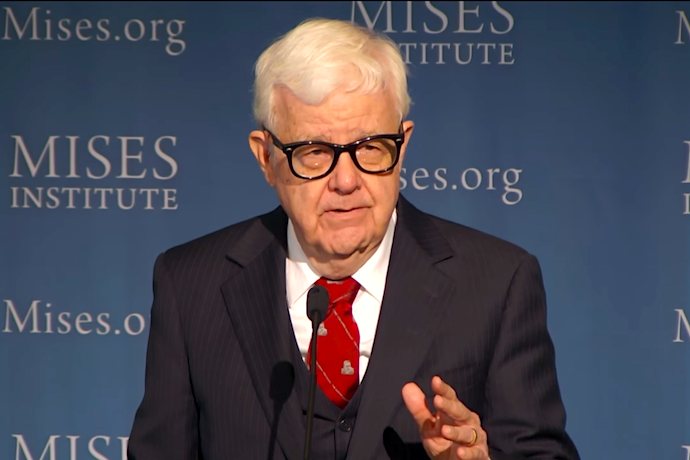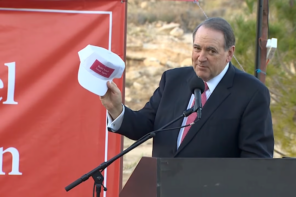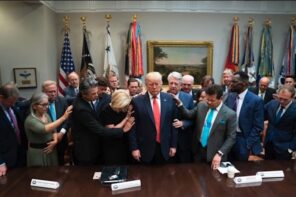If you’ve never heard of Gary North that may be because he wanted it that way. Nevertheless, when North died in Georgia recently at age 80, he’d quietly become one of the notable religious and political architects of our time. He was a prolific author and an éminence grise of the Christian Right who never gave media interviews, but who, in an ultimate irony, received major obituary notices from Christianity Today and The New York Times (publications he loathed) and not much elsewhere.
The Times headline called him an “Apostle of Bible-Based Economics,” and Christianity Today declared that North “Saw Austrian Economics in the Bible and Disaster on the Horizon.” All true. But both obits made little assessment of the political and theological significance of his life and prodigious work as an author, editor, publisher and back room political strategist. Let’s see if we can help.
The 1976 election featuring professing evangelical Christian Jimmy Carter, and propelling him to the presidency, provided an opportunity for conservative evangelical leaders. Evangelicals had mostly been on the political sidelines since the Scopes Trial, and their premillennial theology generally held that one could not expect to change the world much until Jesus returns. This view restrained political activism, since the church was essentially warning against it.
The much smaller postmillennialism camp held that changing the world was not only a requirement, but a prerequisite for Jesus to return. Nevertheless, evangelicals turned out for Jimmy Carter, one of their own, paving the way for more conservative political engagement and the Reagan era in 1980. Times being what they were, this called for discussion.
A series of such discussions were held in the 80s under the auspices of the Coalition on Revival. Briefly, these conversations concluded that Christian engagement with society was a necessity and that people could agree to disagree on how much could be accomplished before Jesus returned. This provided an opening to begin to encourage unprecedented levels of political activism in the evangelical world.
One of the outcomes of these conversations was A Manifesto for the Christian Church, issued by 125 leaders in 1986. The signers, along with North and other Christian Reconstructionist thinkers, included such top Christian Right leaders of the day as Tim LaHaye of American Coalition for Traditional Values, D. James Kennedy of Coral Ridge Ministries, Don Wildmon of the American Family Association, Michael Farris of the Home School Legal Defense Association, and Jerry Regier, the founding president of the Family Research Council—as well as evangelist Luis Palau, and Adrian Rogers, who was president of the Southern Baptist Convention during the fundamentalist takeover in the late 1970s and early 80s. The results of this, and related theological realignments, are still rippling through evangelical Christianity.
In addition to his involvement in the Coalition on Revival, North played leading, but not news-making, roles in other significant entities. He founded his own think tank and publishing house, the Institute for Christian Economics. He was a founding board member of the pioneering Christian Right law firm, Rutherford Institute, as well as the conservative leadership network, the Council for National Policy. He was an “Associated Scholar” of the libertarian Mises Institute at the time of his death.
Theocracy not now, but later
The Times obit mentions how North favored a “harsh theocracy” with his notions of “biblical economics” at its core. But Christianity Today describes him as a proponent of “theonomy.” North himself explained the difference as he saw it. He wrote that theocracy as it’s generally understood, is a “top down” imposition of a theocratic order, while theonomy is what he calls a “bottom up theocracy” enroute to what he calls a “majoritarian theocracy” that, once empowered, would drive humanism “from the face of the Earth.”
“Theocracy is government by God’s law—not just civil government, but all government. It is not a top-down imposition of biblical law by an elite of priests, but, in contrast, a bottom-up imposition of biblical standards over every area of life—areas not regulated by civil law for the most part—by those people who are morally responsible for making decisions. As the process of dominion extends the authority of Christians over more and more areas of life, we will see the creation of a comprehensive theocracy. It will not come as the result of some sort of ‘palace revolution.’”
This is similar to the view of his father-in-law, the seminal thinker of the theocratic Christian Reconstructionist movement, R.J. Rushdoony. Assuming they were honest about their vision of a slow motion revolution in the hearts of men on the road to religious and political dominion—what they didn’t seem to anticipate is that they couldn’t control how others used their ideas.
Once the Reconstructionists provided a biblical rationale for a Christian politics and the basis for a comprehensive set of public policies (which is what their work did) the political animals soon left the barn, never to return. Some of them haven’t been inclined to wait for a popular majority to elect Christians of the right sort to power—as we saw on J6.
North’s life and theology were animated and informed by a sense of imminent apocalypse: nuclear, financial, and otherwise. He made news for a while because he thought that world systems would crash when computer clocks turned to the new millennium in 2000. (The so-called “Y2K bug.”) He thought that Christian Reconstructionist-informed Christians would rise up from the ashes to build the foundations for the Kingdom of God. He was wrong about all that.
Some thought that the spectacular failure of North’s prediction would broadly discredit him. But that did not happen, as is often the case when prophecy fails. He continued to be a respected thought leader in the communities to which he related. He was, for example, a featured speaker at a national Christian Reconstructionist conference in 2007 cosponsored by several leading organizations of the Christian Right.
I wrote about the role of Gary North in the ideological development of the Christian Right in my 1997 book Eternal Hostility: The Struggle Between Theocracy and Democracy. Scholars Sara Diamond, Julie Ingersoll, Michael McVicar and Frances Fitzgerald, among others, have also noted the significance of North in these historical developments.
Somehow North’s obituarists overlooked all this.
Religious Liberty for Me; Death for Thee
North was a patient revolutionary. He opposed the assassination of abortion providers and active organizing for insurrection. He wanted to avoid a “premature revolutionary situation.” Writing at North’s website, his obituarist, Craig Bulkeley, a minister in the schismatic Presbyterian Church in America (PCA), stated that North believed,
“God’s kingdom would not likely come in a single generation. Nor would it come from some sudden political takeover, a centralized government, or vigilante violence. It would not come from the top down. But it would come. It would come gradually, over time, from the bottom up, as God moved in people’s hearts and they embraced a biblical worldview and system of law.”
North himself sometimes expressed his vision in less pacific terms. In his 1989 book, Political Polytheism: The Myth of Pluralism. He believed, for example, that as a matter of strategy it might be worthwhile to temporarily advocate pluralism while plotting for the takeover. He predicted that eventually “pluralism will be shot to pieces in an ideological (and perhaps even literal) crossfire,” in an “escalating religious war.”
That he could hold such a deceptive and violent view while also believing that God needs to move in people’s hearts before Biblical law can become the law of the land, is a paradox that goes unacknowledged by North’s obituarists.
North believed that the Constitution proscribes the merger of church and state but that this proscription derives from the ban on religious tests for public office in Article 6 and that it’s far more significant than the First Amendment in this regard. In his view, only Christians of the right sort should be government officials.
Thus, he considered the Constitution to be not only a distinct break with the established churches of the colonial era, but a permanent barrier to Christian theocracy. He wasn’t wrong. And it’s why he believed the Constitution would have to be scrapped someday.
The influence he had across his lifetime via his prolific writing, speaking, publishing the work of others, and strategizing toward eventual and inevitable religious war, should give us pause when we consider his view of religious freedom:
“We must use the doctrine of religious liberty to gain independence for Christian schools until we train up a generation of people who know that there is no religious neutrality, no neutral law, no neutral education, and no neutral civil government. Then they will get busy in constructing a Bible-based social, political and religious order which finally denies the religious liberty of the enemies of God.”
When he says raising up a generation, he means producing a lot of children and homeschooling them or sending them to Christian private schools. If you don’t agree with Gary North’s religious and political vision, you may find yourself on God’s enemies list, when it’s compiled by North’s political descendants.
North’s books have been widely used in conservative Christian schools around the county. His readership no doubt increased when he, along with Catholic neo-Confederate author Thomas Woods (a founder of the League of the South) launched the Ron Paul homeschooling curriculum in 2013. It has probably been used by tens of thousands of homeschooling families. He also created a related online K-12 school.
Like his early mentor R.J. Rushdoony, Gary North saw his life’s work not as the answer or the pure doctrine for others to follow, so much as helping lay a foundation for the revolution and the Kingdom to come. And although the revolution may never come to pass, North’s ideas, and the political and religious forces informed by them, make him a central character in the story of our time.





